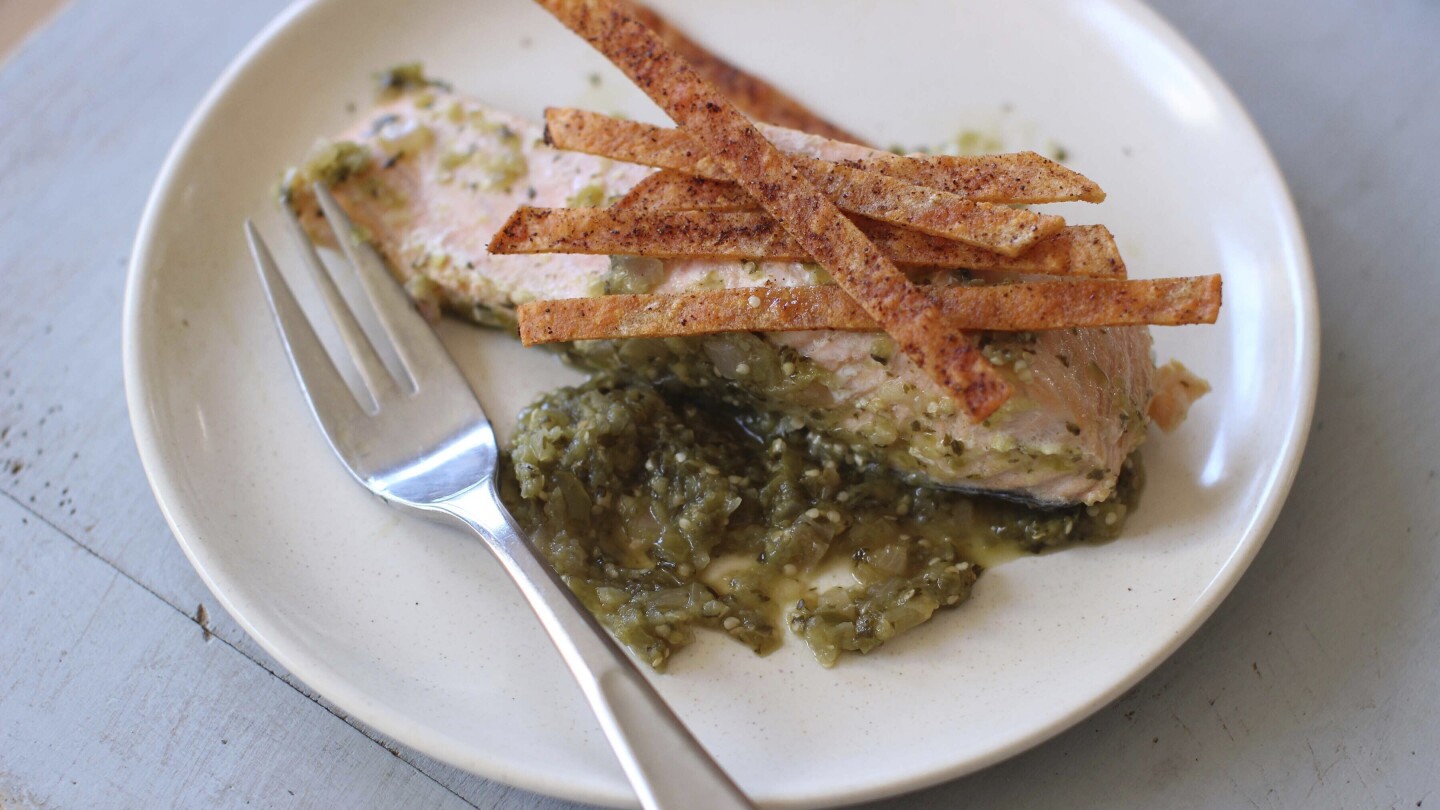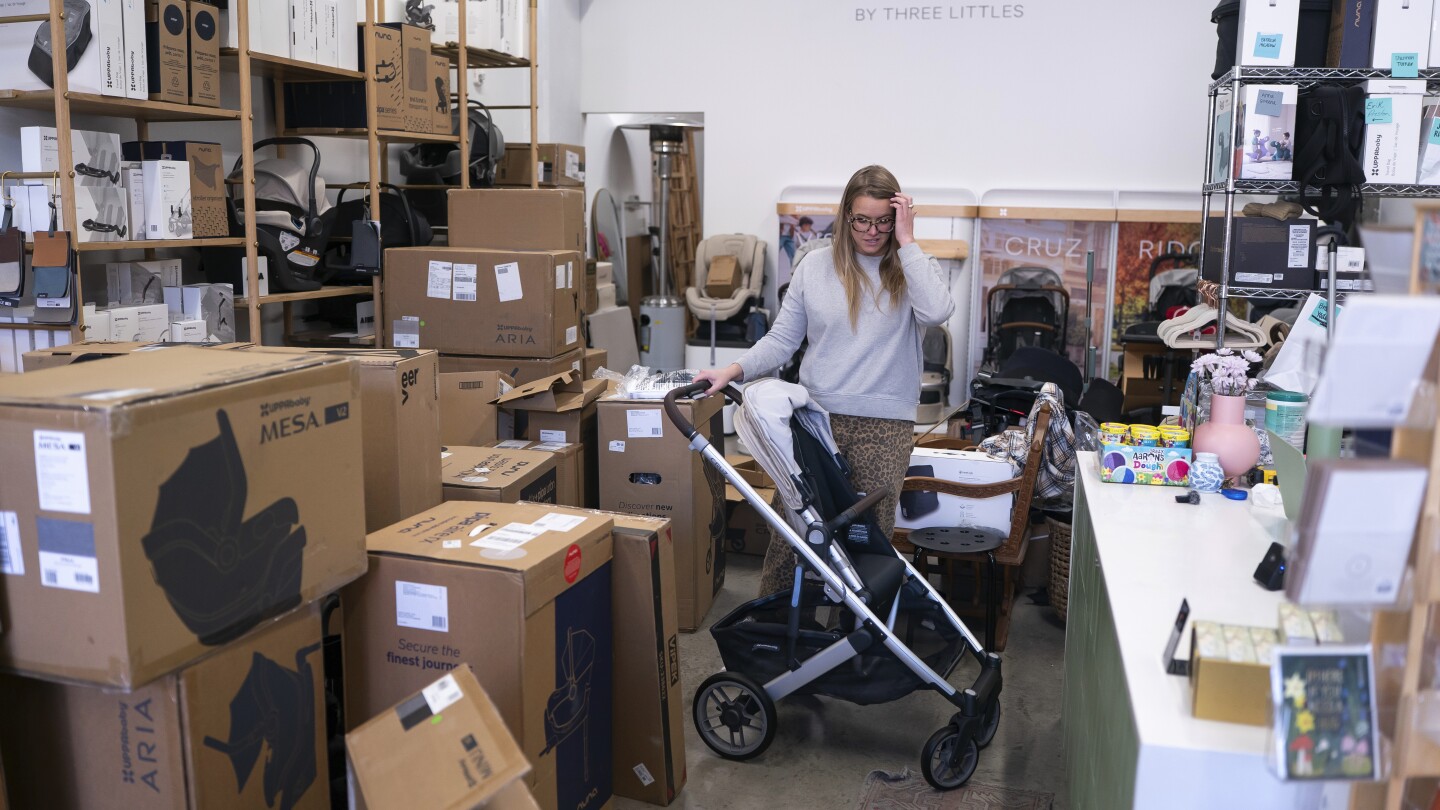Lifestyle
Do you eat a meal in 20 minutes or less? It might be time to slow down

LONDON (AP) — You can have your cake and eat it too — just do it slowly.
Experts tend to focus on the kinds of foods you can eat to improve your health. But the speed at which you devour your dinner matters just as much. There are risks with eating too fast — think stuck food and the potential to overeat before your brain tells you to stop. (Inhaling your food also risks annoying your slower-paced dining companions or the person who took the time to cook your meal.)
Here are some tips from scientists on how to slow down and take a more mindful approach to consuming your diet.
How fast is too fast?
If you’re the kind of person who can regularly polish off breakfast, lunch or dinner in less than 20-30 minutes, you are eating too fast.
“It takes about 20 minutes for the stomach to communicate to the brain via a whole host of hormonal signals that it’s full,” said Leslie Heinberg, at the Center for Behavioral Health at the Cleveland Clinic. “So when people eat rapidly, they can miss these signals and it’s very easy to eat beyond the point of fullness.”
Why is that a problem?
People who eat quickly are likely to swallow more air, Heinberg said, which could lead to bloating or indigestion. Not chewing your food properly can also compromise digestion, meaning you won’t get all of the nutrients from your food. Unchewed pieces of food also could get stuck in your esophagus.
Some previous studies have suggested that people who eat quickly have the highest risk of obesity, while the slowest eaters were the least likely to be obese.
How can you slow down when eating?
For starters, turn off the TV and put down your phone.
“If you’re eating while you watch TV, people tend to eat until there’s a commercial or the show is over,” Heinberg said, adding that people are less inclined to pay attention to the body’s own signals that it’s full. “When we do things while we’re eating, we’re eating less mindfully. And that often causes us to eat more.”
She said that when people focus exclusively on eating, they tend to enjoy the meal more and eat less.
Heinberg also acknowledged the pace at which you eat is often an ingrained habit, but said change is still possible. She suggested things like using your non-dominant hand to eat, trying utensils you might not ordinarily use like chopsticks or taking a deliberate break to drink water when your plate is partially empty.
If you have a busy life, it might be unavoidable to eat lunch at a work meeting or snack while running errands. But Sarah Berry, chief scientist at the British nutritional company ZOE, said when possible, “be mindful of what the food tastes and feels like.”
“If we’re not fully present, it’s very easy to eat more quickly and not notice how much we’ve consumed,” Berry said.
Chew your food, just like mom told you to
One of the simplest things to do is to increase the number of bites you take, said Helen McCarthy, a clinical psychologist with the British Psychological Society.
“If you chew each mouthful a little bit longer, that will slow down your eating,” she said.
The kind of food you eat may also make a difference, pointing out that it’s much easier to eat ultraprocessed or fast foods quicker, because they typically have a softer texture.
“It’s hard to eat vegetables and protein at the same rate as something that’s highly processed and requires less chewing,” McCarthy said.
Some of her patients also reported an unintentional side effect once they began eating more slowly, referencing one woman who often ate a tube of potato chips every evening. When McCarthy told her to slow down and eat every single chip individually, her patient told her “it was like having a mouthful of claggy chemicals.”
“She didn’t find (the chips) enjoyable anymore,” McCarthy said.
___
The Associated Press Health and Science Department receives support from the Howard Hughes Medical Institute’s Science and Educational Media Group. The AP is solely responsible for all content.
Lifestyle
A Pentecostal church in South Africa holds mass Easter weddings for 3,000 people, some polygamous

JOHANNESBURG (AP) — A Pentecostal church in South Africa celebrated Easter Sunday with mass wedding ceremonies for around 3,000 people, with many of them entering into polygamous marriages.
The International Pentecost Holiness Church said mass weddings are part of its Easter festivities and the tradition of polygamy, which is observed in some African cultures, has been incorporated into the church.
Sunday’s ceremonies would see some men marry their sixth or seventh wives, church spokesperson Vusi Ndala said. Other grooms were set to marry multiple brides at one time, Ndala said.
“Polygamy is not only embraced but held in high regard” in the church, Ndala said.
A man with his wife and two of his brides walk, during mass Easter weddings for 3,000 people, some polygamous, at the International Pentecost Holiness Church in Heidelberg, east of Johannesburg, South Africa, Sunday, April 20, 2025. (AP Photo/Themba Hadebe)
Couples dance as they enter the church building during mass Easter weddings for 3,000 people, some polygamous, at the International Pentecost Holiness Church, in Heidelberg, east of Johannesburg, South Africa, Sunday, April 20, 2025. (AP Photo/Themba Hadebe)
People queue during mass Easter weddings for 3,000 people, some polygamous, at the International Pentecost Holiness Church in Heidelberg, east of Johannesburg, South Africa, Sunday, April 20, 2025. (AP Photo/Themba Hadebe)
The International Pentecost Holiness Church was founded in South Africa in the early 1960s. It is an African-initiated church, meaning it was founded by Africans rather than foreign missionaries, and blends Pentecostal beliefs with local traditions.
The church has held mass weddings before, including in 2023 when around 400 couples or bridal parties tied the knot. It says this year’s event was its largest by far.
Ndala said the large number of people being married this year was because of “a large number of men marrying more than one wife at a go.”
In some cases, grooms brought their current wife or wives to be with them for their new marriage.
The weddings were held at the church’s headquarters, a huge, dome-shaped building in the town of Heidelberg, near Johannesburg, that can seat 60,000 people.
The congregants who were being married waited in long white tents set up in open fields next to the church building, where they were given bridal flowers, food packs and water. They then filed into the church building in long queues, the women wearing white bridal gowns and many of the men in matching white suits and red ties.
Polygamy is legal in South Africa if the union is registered as a customary marriage.
A man with his wife and two of his brides sits inside a marquee ahead of the mass Easter weddings for 3,000 people, some polygamous, at the International Pentecost Holiness Church in Heidelberg, east of Johannesburg, South Africa, Sunday, April 20, 2025. (AP Photo/Themba Hadebe)
A groom in a wheelchair is assisted by a fellow member whilst his two brides walk in front, during mass Easter weddings for 3,000 people, some polygamous, at The International Pentecost Holiness Church in Heidelberg, east of Johannesburg, South Africa, Sunday, April 20, 2025. (AP Photo/Themba Hadebe)
___
AP Africa news: https://apnews.com/hub/africa
Lifestyle
Queen Elizabeth II’s favorite dog breed race for glory in the UK’s Corgi Derby

LONDON (AP) — Some of the fastest canines on four very short legs have raced for glory in Scotland’s annual Corgi Derby.
The Musselburgh Racecourse Corgi Derby was first held in 2022 to mark Queen Elizabeth II’s 70 years on the throne. The late monarch was a devoted corgi fan who owned almost 30 of the breed over the decades, along with a few dorgis – a corgi-dachshund cross.
Four-year-old Juno beat a 16-strong field of dashing dogs dressed in bright sweaters over the 230-foot (70-meter) race on Saturday at the racecourse outside Edinburgh. She came from behind in the final stretch to beat last year’s winner, Rodney.
The winner and her owners, Alisdair Tew and Fran Brandon, were presented with a trophy and dog treats by tennis coach Judy Murray, mother of Scottish star Andy Murray.
Tew told the BBC that “we trained her for this last year but this year we just resorted to just letting her chasing things, particularly seagulls” on Edinburgh’s Portobello Beach.
“Juno is always ready for treats -– that is probably why she won,” he said.
Elizabeth’s love of corgis began in 1933 when her father, King George VI, brought home a Pembroke Welsh corgi they named Dookie
Corgis were often by Elizabeth’s side in the decades before her death in September 2022 — accompanying her on official tours, reportedly sleeping in their own room at Buckingham Palace and occasionally nipping the ankles of visitors or royal family members.
Three corgis even appeared alongside the queen as she climbed into James Bond’s waiting helicopter in the spoof video that opened the 2012 London Olympics.
Lifestyle
Tariffs are likely to make having a baby cost more

Sam Rutledge and his wife have a baby due in mid-July, so they thought they had a few more months to research and buy the gear they’ll need.
But President Donald Trump’s tariff announcement in early April turned the couple’s slow walk into a sprint. In the past few weeks, they’ve bought two strollers, a car seat, a nursery glider, a crib and a high chair. All of them are made overseas.
“These are all pretty expensive under normal conditions, but when it became clear tariffs were coming we decided to buy them in case they became prohibitively expensive,” said Rutledge, who is a high school physics teacher.
Raising a child in America has never been cheap. In the first year alone, it costs an average of $20,384, according to Baby Center, a parenting website. But tariffs – ranging from 10% for imports from most countries to 145% for imports from China — will make it many times more expensive for new parents.
An estimated 90% of the core baby care products and the parts that go into making baby paraphernalia – from bottles and diaper pails to strollers and car seats – are made in Asia, according to the Juvenile Products Manufacturers Association, a U.S. trade group. The vast majority come from China.
“Overseas manufacturing has been the norm in our industry for decades,” said Lisa Trofe, the association’s executive director.
It wasn’t always this way. When Munchkin Inc. CEO Steven Dunn founded his company in 1991, it made baby bottles in California with tooling from New Jersey. But over the years, the manufacturers he used shut down and the cost of doing business in the U.S. skyrocketed. Now, about 60% of Munchkin’s 500 products, from a $5 sippy cup to a $254 Night Owl Stroller with headlights, are made in China.
In response to the tariffs, Dunn halted orders from China and instituted a hiring freeze at Munchkin’s California headquarters, where 320 people are employed. Dunn expects Munchkin will run out of some products within three months.
“There is no possibility of being able to pass on those tariffs” to customers in the form of price increases, he said.
Dunn said he tried to reduce his dependence on China in recent years, shifting some manufacturing to Vietnam and Mexico. He also spent a year communicating with American manufacturers to see if one could make Munchkin’s new Flow Nipple Shield, which allows a breastfeeding mother to see if her milk is flowing. But most said they couldn’t make the complex silicone product, Dunn said. It’s now made in Vietnam.
“There’s not enough tool makers and manufacturing expertise and automation and skilled labor in the U.S. to make the thousands of products the juvenile industry needs,” Dunn said.
Multiple baby brands and companies contacted by The Associated Press didn’t respond or said they weren’t commenting on the tariffs, including Graco, Chicco, Britax, Nuna, Dorel Juvenile, UppaBaby, Evenflo and Bugaboo.
The Juvenile Products Manufacturers Association said it asked the Trump administration for a tariff exemption, arguing that baby products are essential for children’s well-being. Trump exempted some baby products, including car seats and high chairs, from import taxes during his first administration. But he hasn’t said whether he would consider doing so again.
The Associated Press left a message seeking comment with the White House.
Nurture&, a company that makes a popular nursery glider and other baby furniture, said it’s trying to be transparent about the impact of tariffs.
In a recent email, the company told customers it started lowering prices on some items when the tariffs hit. The company, which was founded in 2020, said it would keep those lower prices in place until April 30, but after that it may not be able to absorb the full cost of the import duties.
“These are large purchases, these are investments, and this is a very sensitive life stage,” Nurture& Chief Merchant Jill Gruys said. “We want people to make the best decision for their budget and their family.”
Elizabeth Mahon, the owner of Three Littles, a baby store in Washington, said she’s worried the tariffs will make essential products too expensive for some families.
Mahon volunteers twice per month at the Department of Motor Vehicles, where she teaches people how to buckle their kids safely into car seats. Some families still must be persuaded to use car seats, she said. Mahon fears higher prices would be another deterrent.
“No one is dying if they can’t buy a toy, but if they don’t have access to car seats, kids will get seriously injured,” she said.
At her own store, Mahon is getting notices that some manufacturers plan to introduce steep price increases in May. She feels lucky she could rent a storage facility and build up inventory ahead of the tariffs. For many small businesses, she said, the extra costs are “a death sentence.”
At The Little Seedling baby shop in Ann Arbor, Michigan, owner Molly Ging said she would normally be putting in Christmas orders at this time of year. Instead, she’s sorting through price increase notices from many of the vendors she works with.
“It’s a lot to manage, and I just have no idea how it’s going to play out,” she said.
Business is brisk right now, with customers hoping to beat tariff-related price increases. But Ging worries about her 13 employees – all moms who bring their kids to work – and about whether she can maintain enough inventory to meet future demand.
“Babies don’t stop being born because there’s tariffs,” she said.
-

 Middle East2 days ago
Middle East2 days agoTunisian court hands opposition figures lengthy jail terms | Human Rights News
-
Lifestyle2 days ago
The 250th anniversary of the Battles of Lexington and Concord opens debate over US independence
-
Asia1 day ago
Hong Kong’s oldest Democratic Party is shutting down as Beijing leaves no room for dissent
-

 Europe1 day ago
Europe1 day agoRussia Ukraine truce: The real strategy behind Russia’s sudden truce announcement
-

 Middle East1 day ago
Middle East1 day agoIran says progress in nuclear talks with US, confirms third round next week | News
-

 Europe1 day ago
Europe1 day agoLive updates: Trump news on Iran and Ukraine talks, immigration crackdown, tariffs
-
Middle East1 day ago
Israeli bombardment of Gaza kills 92 in two days: Health Ministry | Israel-Palestine conflict News
-

 Europe1 day ago
Europe1 day agoRussia sentences 19-year-old woman to nearly three years in a penal colony after poetic anti-war protest




